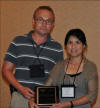Koon-Hui Wang
Source: Nematology Newletter, September 2012
Rev.
01/01/2020
Dr. Koon-Hui Wang received her B.S. degree in horticulture from the
National Taiwan University in 1993. She then enrolled at the University
of Hawaii at Manoa (UH Manoa) and received her M.S. degree in
horticulture in 1996 and Ph.D. degree in plant pathology in 2000.
After leaving Hawaii, she became a postdoctoral research associate at
the University of Florida in Gainesville and was promoted to Assistant
Research Scientist in 2005. In 2007 she returned to UH Manoa as an
Assistant Scientist. Currently, she is an Assistant Professor of
Sustainable Pest Management at UH Manoa. |
 |
| |
Dr. Koon-Hui Wang (R) receives a plaque
commemorating her receipt of the Syngenta Award from Palley
Peterson (L) at the annual meeting of SON in Savannah, GA (August 15,
2012).
Photo courtesy of J. Eisenback |
Dr. Wang’s research has focused
on the integrated management of soilborne pest problems, including nematodes,
fungi, and weeds. She has demonstrated the efficacy of soil solarization against
a range of soil pests. However, her main focus and strength has been the
integration
of multiple tactics including soil solarization, cover crops,
organic amendments, plant resistance, and biological control as alternatives to
methyl bromide for managing soilborne problems.
By combining several
nonchemical tactics, she has achieved levels of pest control that approach the
performance of the methyl bromide standard. She is particularly interested in
crops such as sunn hemp and cowpea that can function both as rotational cover
crops and amendment sources, and has conducted experiments to show that the
rotation effect was more critical than the amendment in suppressing root-knot
nematodes.
Rather than restricting her
work to one agricultural commodity, Dr. Wang has shown that many of these pest
management principles and practices are transferrable to a wide range of crops,
including a number of vegetable crops, and ornamentals such as cut flowers and
caladiums.
While she has made much
progress in the management of soilborne pests, the most impressive feature of
Dr. Wang’s work is that these efforts have been incorporated into the larger
context of soil health in agroecosystems. Her objective is overall plant health,
of which pest management is only one part. She emphasizes that free-living
nematodes involved in nutrient cycling benefit plants by improving overall
nutrient uptake and ultimately plant health.
Using her knowledge of soil
ecology, she is perfecting the use of cover cropping in sustainable agricultural
systems. She has documented the impact on beneficial omnivorous and predatory
nematodes following severe practices such as fumigation with methyl bromide. She
is especially interested in biological control and the potential of practices
such as the use of organic amendments for stimulating biological control agents.
She has made much progress in understanding and clarifying the ecological
conditions useful for stimulating omnivorous and predatory nematodes as well as
nematode antagonistic fungi.
Dr. Wang has authored 60
refereed publications, and numerous proceedings and extension publications. She
has put together several training CDs and videos, and created educational web
pages, and excels at outreach education and university teaching.
She has been very active in the
Society of Nematologists, serving as chair for the Biological Control and
Ecology Committees and has organized several highly successful symposia.
Currently, she serves on the Honor and Awards Committee and is the Vice
President of the Cobb Foundation
Dr. Koon-Hui Wang received the
Syngenta Award for Excellence of the Society of nematologists in August, 2012.
Return to Prominent Nematologists Menu
Go to Nemaplex Main Menu
